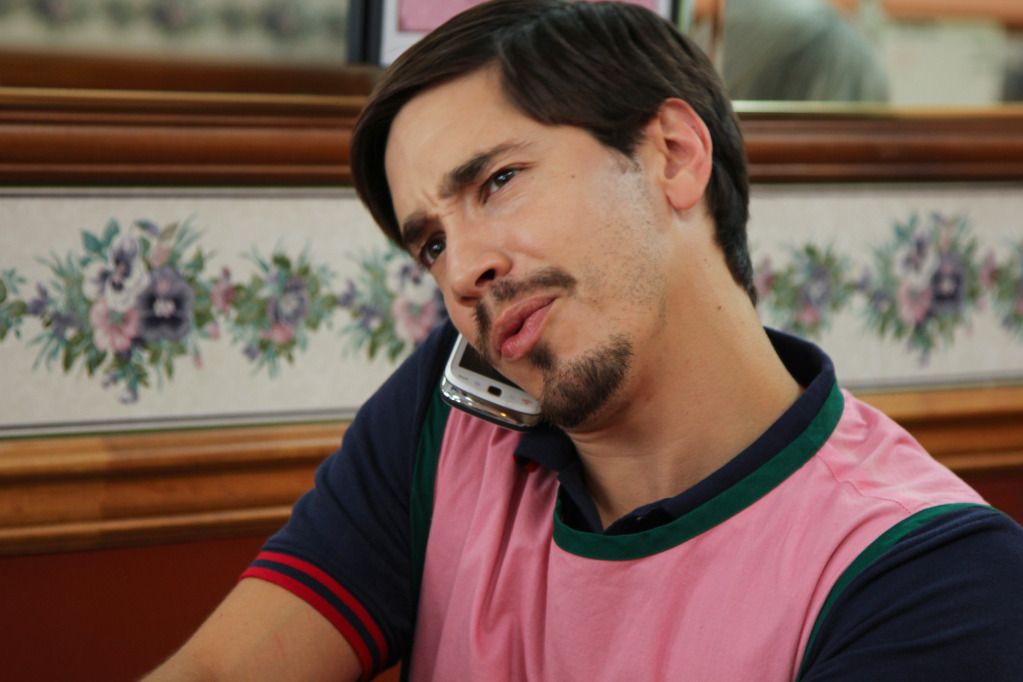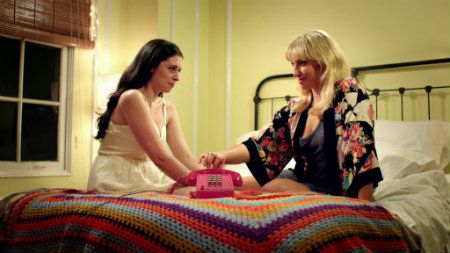For a Good Time, Call…
bills itself as a comedy about two young women living in New York who
inadvertently find themselves the owners of a successful phone sex line.
Starring Lauren Miller, who also co-write the script, and Ari Graynor,
the movie caused a minor stir when it premiered at the Sundance Film
Festival this past January, immediately drawing comparisons to last
summer’s hit Bridesmaids even if thematically the two pictures couldn’t be more dissimilar.

For a Good Time, Call actress Ari Graynor, director Jamie Travis and actress & co-writer Lauren Miller © Focus Features
I
had the pleasure to sit down with director Jamie Travis and co-writer
Katie Ann Naylon to talk about the film during their brief trek to
Seattle. Here are some of the highlights from that conversation.
Sara Michelle Fetters: What led you to Jamie? How did you and Lauren know he was the right one to handle your first script?
Katie
Ann Naylon: How to put this delicately… We were in Canada and as we
knew we’d need a Canadian director. I happened to come across this New York Times
profile of Jamie talking about his short films and we were immediately
intrigued. After watching those films, we realized how right he was for
the job. He’s exceptionally talented. Definitely a filmmaker on the
rise.
Sara Michelle Fetters: For you, Jamie? What was it like when they approached you with the script?
Jamie
Travis: Elated. I was looking for a feature project. Was certain it
would be something I would write and then direct myself. But then this
came along, and it [the script] was just so good. Couldn’t put it down. I
loved what Katie and Lauren had come up with, felt like it could go in
so many different directions. I immediately didn’t want it to fall in
the wrong hands. Was like I was personally connected to it.
Sara Michelle Fetters: What do you mean by that?
Jamie
Travis: Felt like it was so easy for this film to go in the wrong
direction. The wrong director could objectify these women, make them
caricatures. What needed to be done was to focus on the friendships, to
use the structure of a love story to make this relationship between
these two women feel real. It needed that ‘gay man’s touch,’ if you
will, and I just knew my insight into female friendships wouldn’t make
the overt sexuality of the story subvert the emotional truths [our
heroines] were experiencing.
Katie
Ann Naylon: We were immediately sold. He was the only guy that seemed
to get it. We weren’t worried at all that he wouldn’t be able to pull it
off. He understood exactly what it was we were going for, that the
whole ‘phone sex’ thing was just our way of getting into the crux of
Katie and Lauren’s growing friendship.
Sara Michelle Fetters: So not your typical romantic comedy, then?
Jamie
Travis: Not at all. The movie wasn’t about getting the guy, it was
about how these two women learn to accept, then like, then ultimately
love one another in ways women will hopefully relate with. The heart of
the story is that friendship, not whether or not Katie gets together
with her crush or that Lauren and her ex get back together. This struck
me as something intimate; something true. I wanted to make sure and do
that story the justice it so richly deserved.
Katie
Ann Naylon: The ‘Bromance’ has suddenly become its own genre, and
Lauren and I felt like there weren’t many similar comedies out there
revolving around women and their relationships. The goal wasn’t to be
sexual even though we were talking about sex. The goal was to remain
true to these two women and their friendship. We wanted to showcase the
love between them in a way that would show all the highs, lows and
in-betweens. Women can be so judgmental, we can be incredibly insecure.
The idea was that we wanted to judge our characters appropriately, not
through rose colored glasses, and hopefully in the process make their
love for one another feel genuine and real in the process.
Sara
Michelle Fetters: Were you ever conscious or worried about playing to
close to stereotypes, especially as it relates to Justin Long’s ‘gay
best friend’ character?
 Justin Long in For a Good Time, Call... © Focus Features
Justin Long in For a Good Time, Call... © Focus Features
Katie
Ann Naylon: Not at all. As written, he’s the one that gets what’s going
on. He calls Katie and Lauren on their [crap]. Justin intuitively
understood what was going on and what was required of him. I never
thought he overplayed his hand. He’s obviously gay, but he isn’t in your
face about it or anything. He gets that your friend is your friend no
matter what, and I liked that he was so willing to pull down so many
walls in order to access the character.
Jamie
Travis: Yeah, Justin got it right from the start. He understood that we
didn’t want another ‘gay best friend’ stereotype. Early on, he was
calling me working on the voice trying to figure out the best way to
become the character. He started asking if he could record my voice,
then he started following me around the set. It suddenly hit me he was
using me as the template for the character, sort of a heightened version
of who I am. It was both startling and flattering. He’s such an
intuitive actor and I think his performance really comes from the heart.
He definitely finds the right balance between being too flamboyant and
being the kind of friend both Katie and Lauren are in need of.
Sara Michelle Fetters: There is a bit of an old Hollywood feel to the film, almost a Doris Day Pillow Talk sort of vibe the belies the sexually explicit nature of some of the situations and dialogue.
Jamie
Travis: Thank you for that. We were shooting it in a very 1950s, 1960s
sort of way, trying to make sure that the simplicity of the story was
never lost and remained front and center. It is in many ways a genre
throwback, definitely a Doris Day sort of thing in its way. We wanted to
achieve that sort of vibe. It just felt like the proper process in
order to make sure the movie worked.
Sara
Michelle Fetters: Post-Sundance, what do you hope happens now for the
film? What do you want audiences talking about as they leave the
theatre?
Katie
Ann Naylon: I like that the movie isn’t what people expect it to be. I
like that it seems to creep up on people, that they find themselves
connecting to it on an emotional level they hadn’t anticipated. The
movie is funny. It is romantic. But it is also a story of female
relationships the likes of which sadly don’t get represented enough on
the [big screen] in my opinion. I think it will resonate with a lot of
people. At least, I hope it does.

Lauren Miller and Ari Grayon in For a Good Time, Call... © Focus Features
Jamie
Travis: It’s a beautiful, consciously female story, and I’m sure that
will come as some sort of surprise for some people. But I want them to
leave the theatre filled with joy. I think we represent Kate and
Lauren’s journey for exactly what it is, their love something all
viewers, male-female, gay-straight, will hopefully be able to relate to,
appreciate and embrace.
- Interview reprinted courtesy of the SGN in Seattle











No comments:
Post a Comment